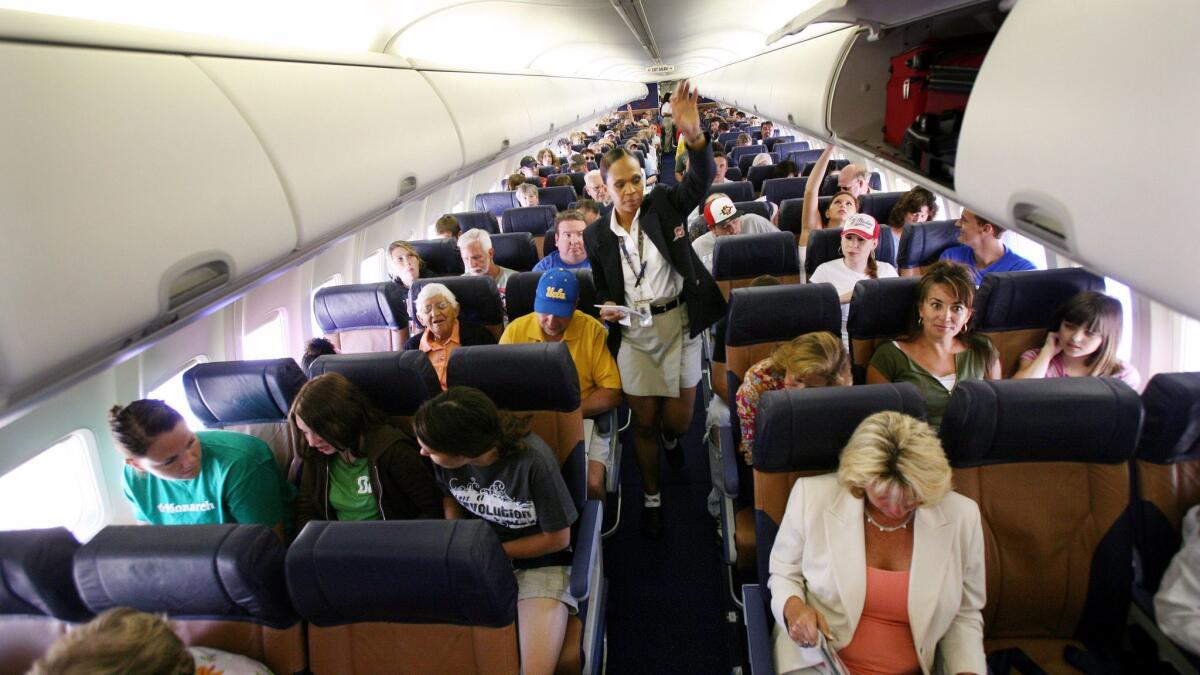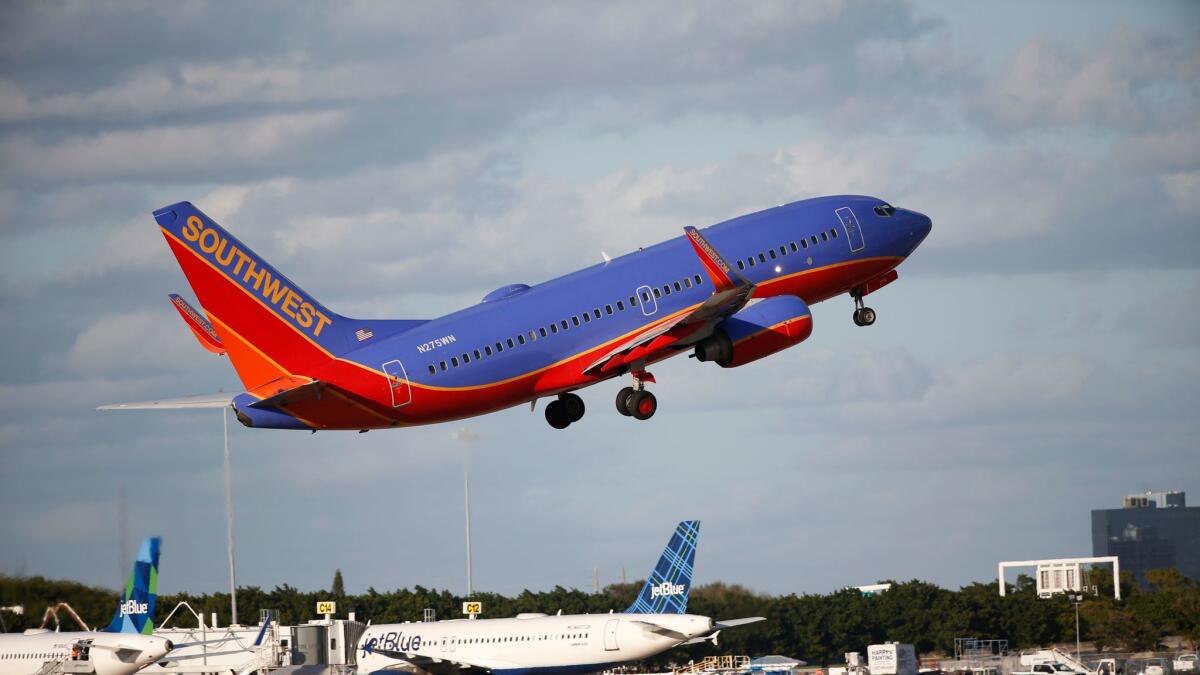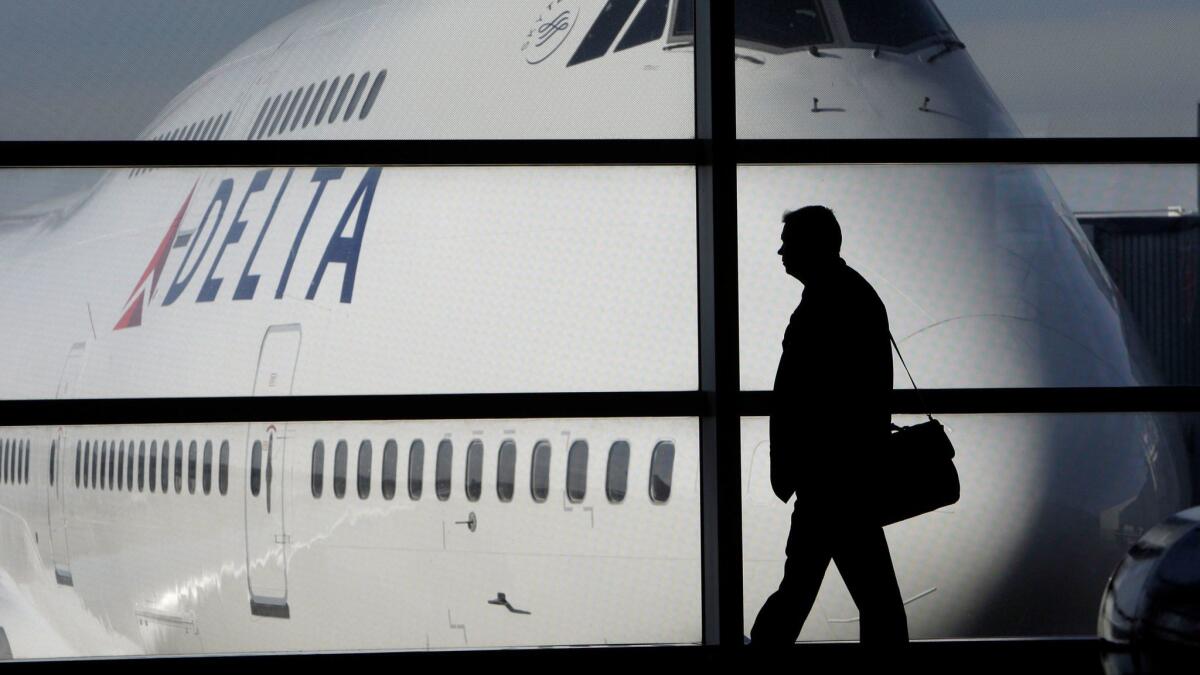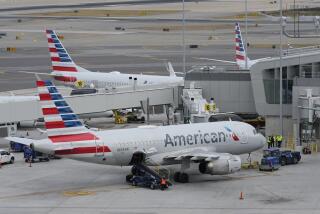Despite those viral videos, airlines are turning passenger bumping into a data-driven art

The last time transportation expert Seth Kaplan was bumped from a flight, he walked away with $800 and a good excuse for missing the first session of a San Diego business conference.
Such compensation may start sounding like chump change.
In the wake of last month’s United Airlines passenger-dragging scandal, the Chicago-based carrier and several other U.S airlines have promised to overbook fewer flights and offer better incentives — up to $10,000 in cash or travel vouchers at United and Delta Air Lines — if fliers are asked to give up their seats. Those policy changes could combine to make passenger bumping even more rare and lucrative.
“People who are bumped are going to be happy,” said Kaplan, managing partner of the trade publication Airline Weekly. “It works out well for airlines and for customers.”

A passenger was dragged out of a United Airlines plane due to the airline overbooking the flight, creating yet another PR nightmare for United Airlines.
Is overbooking outdated?
Passenger bumping became a hot issue after video surfaced last month of 69-year-old Dr. David Dao being forcibly removed from a United jet. Yet, despite the public outcry over passenger treatment, most airlines already were quietly working to bump fewer travelers by finding better ways to crunch travel data.
Southwest Airlines — the nation’s largest domestic carrier — quickly followed the United incident by announcing that it would no longer overbook flights. And JetBlue pointed out during the uproar that it has never overbooked.
The two carriers contend that overbooking is an outdated practice that costs more than it adds to the bottom line.
Airlines for years have routinely sold too many tickets for flights because they know a small percentage of travelers won’t show up. Carriers can maximize revenues by selling those empty seats to last-minute fliers for a huge markup.
Industry experts say overbooking can result in a 1% revenue increase for an airline because last-minute tickets can sell for two or even three times the average seat price without a hike in overall costs.
“Overbooking allows airlines to increase capacity on fixed-cost assets,” said Bruce Spear, a partner at Oliver Wyman, a management consultant firm.
But if airlines miscalculate how many passengers won’t show up, problems erupt.
The nation’s 15 largest carriers spent $23.6 million last year to compensate passengers who had to give up seats on overbooked flights, according to the U.S. Department of Transportation.
And then there’s the ill will caused by confrontations with passengers who don’t want to be bumped, especially when most passengers are equipped to immediately post unflattering videos.
The information is so good that airlines can overbook and rarely inconvenience the passengers.
— Henry Harteveldt, industry analyst
Why overbooking is on the decline
Federal data show that the nation’s biggest airlines are bumping fewer passengers than ever before.
In 2016, the largest U.S. carriers bumped at a rate of 6.2 passengers for every 100,000 fliers who boarded, the lowest rate since the U.S. Department of Transportation began keeping that data in 1995 when the rate was 10.6 bumped passengers for every 100,000 fliers.
A big reason for the decline is that airlines have become better at forecasting how many passengers won’t show up for a flight. This means carriers can gauge more accurately how many seats they can resell.
By analyzing the passenger makeup on each flight, airlines can now get a better idea of how many passengers are likely to miss their flight.
Business travelers, for example, are more likely to miss a flight because of meetings that run late or other scheduling problems. Also, business travelers are more likely to buy refundable tickets, so they face fewer penalties for missing a flight.
However, a family traveling for vacation is less likely to miss a flight because they usually buy cheaper, nonrefundable tickets.
“The information is so good that airlines can overbook and rarely inconvenience the passengers,” said Henry Harteveldt, a travel industry analyst at Atmosphere Research Group.
Other industry changes also have contributed to the decline in overbooking. For example, more passengers buy nonrefundable tickets than in the past, making it more likely that nearly all fliers will show up for a flight.

How Southwest and JetBlue avoid selling too many seats
At Southwest Airlines, almost 99% of passengers show up for flights, “so the number of unexpected empty seats has dropped dramatically,” said Brandy King, a spokeswoman for the Dallas-based carrier.
Although airlines want to fly each plane as close to full capacity as possible, they also want to sell each seat for the highest price they can.
Thanks to better forecasting tools, King said, Southwest can more accurately predict how many people will want to buy last-minute seats for a premium rate. Knowing this, Southwest can estimate how many seats to set aside for those last-minute buyers.
“Putting it all together, the bottom line benefit is so modest, we decided it was more beneficial to reduce the number of oversold flights,” she said.
In addition, Southwest Airlines recently finished installing a booking software program that better manages seat inventory on each route. This allows the airline to see how many seats are available on all flights between two airports.
JetBlue also has a very low rate of no-shows, partly because it is a point-to-point airline that doesn’t operate a lot of hubs with connecting flights. And it serves mostly leisure travelers, who are not big on missing flights.
“When a customer purchases a flight, they shouldn’t need to worry about not getting a seat just because another customer has shown up at the gate,” JetBlue spokesman Morgan Johnston said.

Airlines try bidding systems and iPads
United Airlines has long had a practice of overselling each flight by less than 3%. For a flight with 150 seats, that means the carrier would typically sell 154 tickets.
But after the Dao incident, the Chicago-based carrier said it would cut back on overbooking, especially on flights that have historically had a lower rate of volunteers to give up seats and on the last flight of each day.
United also said it plans to create an automated system that asks passengers during the check-in process if they would be willing to give up their seats in the case of an overbooked flight.
Delta has operated a similar system since 2011. When Delta fliers check in online or at an airport kiosk, they are asked to bid on how much they would want in travel vouchers to give up their seats. If the flight is overbooked, Delta gives a voucher to the flier who offered the lowest bid.
The Atlanta-based carrier has even given its gate agents the authority to award a passenger an iPad as compensation for giving up a seat. Delta bumped at a rate of one passenger for every 100,000 fliers last year, behind only Hawaiian Airlines for the lowest rate among the nation’s biggest carriers.
“Our system,” Delta Chief Executive Edward Bastian said, “works pretty well.”
To read more about the travel and tourism industries, follow @hugomartin on Twitter.
ALSO
LAX begins massive relocation of 15 airlines in the central terminal area
The big LAX terminal shuffle will let JetBlue create a lobby with (almost?) no lines
Flier beware: 5 things to know before you head to LAX this weekend (and Monday and Tuesday too)







